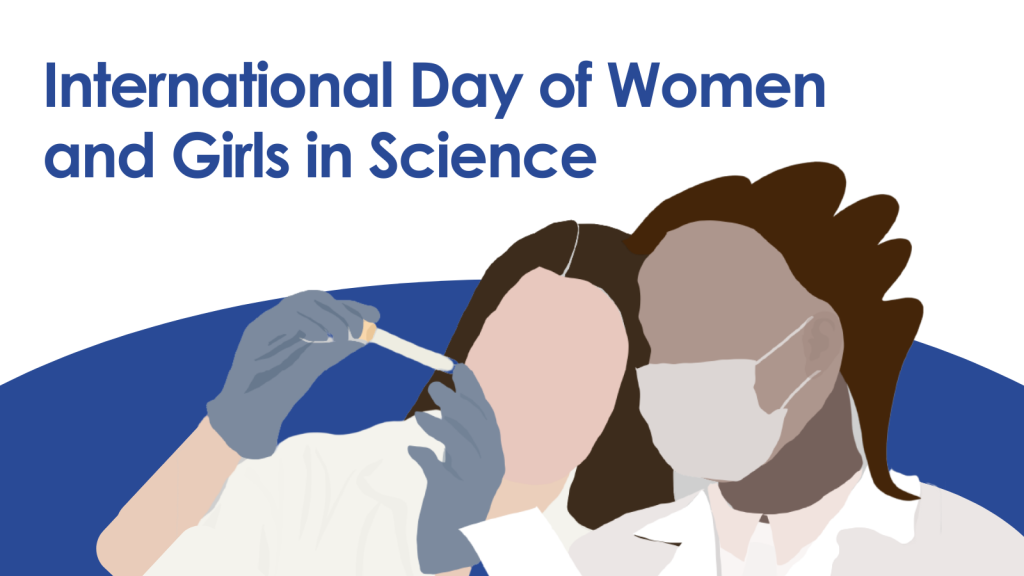The world has made both science and gender equality a priority. According to the United Nations, both are “vital for the achievement of the internationally agreed development goals, including the 2030 Agenda for Sustainable Development.” While there have been important advancements to include women in science, at the moment less than 30 percent of researchers globally are women.
We celebrate that our team, the Active Aging Research Team at the University of British Columbia, is female-led and driven.
So, today, we celebrate the women of the Active Aging Research Team. We share their pearls of wisdom, but read on for their responses to a brief questionnaire. They are brilliant and inspiring.
Lessons & Memories from the Women of the Active Aging Research Team
“If you don’t see a clear path in front of you, you might have to make your own. Take it step-by-step. It’s ok if you don’t know if you don’t have it all figured out yet.”
“I wanted to understand how to take research findings (e.g., physical activity is good for you) and apply them to help improve peoples’ lives.”
“Find a mentor that you admire and that will take the time to challenge you to succeed, and make sure the area you go into is one you are passionate about, it will show in your work!”
“Self-doubt was/is probably the greatest challenge — regularly feeling like an imposter (not uncommon in academia!)”
“Incredible people who became lifelong friends and mentors [helped me to stay with my career goals]. My greatest incentive as I ‘pay that forward’, is working with talented, passionate, and committed young women. They surprise and inspire me every day.”
“Knowing where your passion (potentially) lies is truly a blessing! Disregard the false stereotypes in the field and do what your heart desires.”
“My parents didn’t see Kinesiology as a great field of study and think it’s the equivalent of personal training. It was challenging to convince them otherwise.”
“My early training and research was in neurovascular physiology. In this space, not only did I learn about an incredibly complex and connected physiological system, but I realized that communication, translation of evidence, and relationships between people and organizations had a huge influence on health science advancements.”
“Let your curiosity guide you. There are many areas and career paths in science and it is important to love your area. Keep exploring until you land where you feel passion for change!”
“I think there is probably a field out there for everyone and so many skills are transferrable between fields. You can’t know everything — build a community, collaborate, find a supportive mentor, create a great team — people who will stand behind you and beside you.”
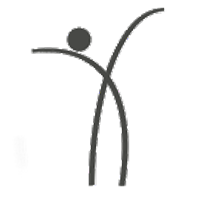
Meet the Women of the Active Aging Research Team
Professor Heather McKay, PhD, Principal Scientist

Professor Heather McKay with her trainee and mentee, (now) Dr. Anna Chudyk
Q. Why did you get into science?
A. I am a curious person — and at a young age realized there were more questions than had answers. I set about answering some of them. I was also very active at every age — always on the go. As a young adult, I felt compelled to find a way to keep large populations of people healthy through physical activity. Small goal ????.
Q. What was a challenge that you faced along the way?
A. I came from a troubled home where post-secondary education was not valued or encouraged. I left home at 16 and had to find a way to support myself and my education.
Q. What helped you stick with your career goals?
A. Incredible people who became lifelong friends and mentors. My greatest incentive as I ‘pay that forward’, is working with talented, passionate, and committed young women. They surprise and inspire me every day.
Q. What advice would you give to other women and girls interested in pursuing a career in science?
A. Aim for the stars — find a woman in science to guide you. Don’t be shy to approach them-send them an out-of-the-blue e-mail and introduce yourself. Every woman in science that I know would be delighted to serve as a mentor to girls or young women who aspire to explore the many, many tremendous, and exciting opportunities in science.
Associate Professor Joanie Sims-Gould, PhD, RSW, Principal Scientist

Dr. Joanie Sims-Gould at the Gerontological Society of America conference with Dr. Paul Stolee.
Q. Why did you get into science?
A. I have always had a lot of questions! My dad is scientist and I grew up with science as part of everyday life.
Q. What was a challenge that you faced along the way?
A. Uncertainty. Early in my education and career I felt I needed to know what all the next steps would/should look like -- I wanted a clear script. With time and experience I have become more comfortable (and dare i say even embrace) uncertainty. I have learned to trust myself and lean in to the unknown.
Q. What helped you stick with your career goals?
A. Strong female role models (gramma, mom, Dr. Heather McKay, Dr. Anne Martin-Matthews) and being a good example for my daughters. I have been fortunate to receive SSHRC, CIHR and MSFHR funding for my work and I feel a deep sense of commitment to ensure that these investments have impact. For me the impact is improving the lives of older people — this propels me in my career goals.
Q. What advice would you give to other women and girls interested in pursuing a career in science?
A. Let your curiosity guide you. There are many areas and career paths in science and it is important to love your area. Keep exploring until you land where you feel passion for change!
Laura Churchill, Research Associate
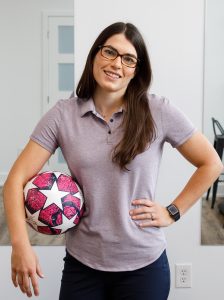
Q. Why did you get into science?
A. I got into science because of my interest in sport and injury. I decided from an early age that I wanted to become a physiotherapist. Along the way I developed research interests in complementary fields: physical activity, sport medicine, orthopaedics, and arthritis.
Q. What was a challenge that you faced along the way?
A. I didn’t get into physiotherapy school on my “first try”. This led to me pursuing a Master of Science and re-applying. I ended up really loving clinical research and pursuing a combined PT/PhD degree—an opportunity I wouldn’t have considered had I not faced the initial disappointment and had to pivot.
Q. What helped you stick with your career goals?
A. A supportive partner, family, friends, and colleagues. Also the realization that goals are allowed to change and evolve as you grow.
Q. What advice would you give to other women and girls interested in pursuing a career in science?
A.Find a great mentor and a team environment that is supportive! When thinking about your career path, consider your values-- what is most meaningful and important to you (i.e. achievement, connection, helping others, family etc.)? Then try to understand what the day to day of different careers actually entail by asking others or shadowing. Pursue a career that aligns well with your values.
Harveen Basra, Research Coordinator
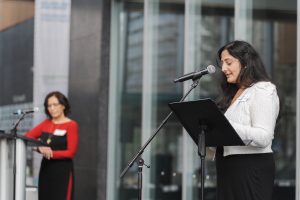 Harveen Basra presenting at Surrey City Hall for the BC Ministry of Public Safety Civil Forfeiture projects.
Harveen Basra presenting at Surrey City Hall for the BC Ministry of Public Safety Civil Forfeiture projects.
Q. Why did you get into science?
A. My passion lies in supporting communities to achieve health and wellness. I entered the science field with my curiosity for human behavior (how people think, feel and behave in different contexts and how factors such as cultural influences, societal norms and interpersonal relationships impact humans). This paired well with my commitment of promoting and implementing health initiatives in the community which resulted in my entry into the research field.
Q. What was a challenge that you faced along the way?
A. The challenge of navigating the transition and nature of high school sciences to university science courses resulting in me questioning my abilities and future career choices. The struggle to attain good grades in certain required science courses began to define/determine my fate in the sciences. Spoiler alert: with time, valuable lessons learnt and self discovery I overcame this challenge!
Q. What helped you stick with your career goals?
A. My rock solid foundation of social support from my loved ones and being a part of a dedicated team that is committed to researching and implementing promotion and prevention strategies to enhance the health of older individuals. I have also received guidance and inspiration from my mentors (women in leadership roles) who remind me to continue pursuing my goals and dreams!
Q. What advice would you give to other women and girls interested in pursuing a career in science?
A. Embrace the unconventional! Do not limit or confine yourself to careers that are traditional and common. Your area of interest may not fit the conventional career options associated with your degree. Embrace the process of inquiry and discovery as you explore alternative career paths that spark passion in you!
Diya Chowdhury, Research Coordinator
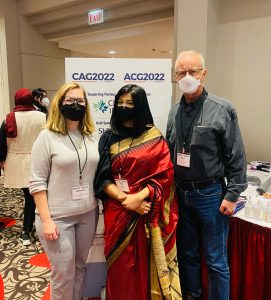
Q. Why did you get into science?
A. I had a rather atypical (for a lack of a better word) and often troubled childhood, and my love of learning, particularly the sciences, was a source of stability. I fell in love with science more and more ever since for more reasons than I can list here. It also helped that I’ve always been a curious person, keen on exercising my creative side, which turned out to be quite helpful in my journey in research.
Q. What was a challenge that you faced along the way?
A. Wanting to do it all. The vastness of science is unparalleled, and I spent (still do!) a lot of time focusing my attention on where I can have the most impact and contribute to my fullest.
Q. What helped you stick with your career goals?
A. Grit, constant inspiration from my incredible mentors, and a desire to make good on their faith in me and my abilities.
Q. What advice would you give to other women and girls interested in pursuing a career in science?
A. Strive to push past the boundaries set by others on what is possible for you to achieve and the impact that you could have on the world (in big and small ways) and find good mentors and loved ones to guide you along the way. Also, don’t be afraid to ask questions!
Dr. Thea Franke, Research Associate

Dr. Thea Franke shares her research
Q. Why did you get into science?
A. My passion for continuous learning and intellectual development propelled me toward a career in science. This field allows me to immerse myself in a perpetual journey of discovery, that not only challenges my current understanding but also contributes to the broader canvas of human understanding and wellbeing.
Q. What was a challenge that you faced along the way?
A. One of the most daunting challenges I encountered was during my doctoral studies, where I was confronted with the expansive and ever-growing body of scientific literature. The process of delineating a unique research niche within such a vast academic landscape was both intimidating and intellectually demanding. This experience taught me the importance of rigorous scholarly inquiry, resilience, and the strategic application of critical thinking to forge a path that was both innovative and impactful.
Q. What helped you stick with your career goals?
A. What has been instrumental in my journey has been a combination of unwavering perseverance and the invaluable guidance and support provided by exceptional mentors.
Q. What advice would you give to other women and girls interested in pursuing a career in science?
A. To women and girls aspiring to a career in science, I recommend finding a mentor who encourages intellectual growth and challenges you to exceed your limits. Ensure your field of choice ignites your passion, as genuine interest significantly influences the quality and innovation of your work. Passion and a supportive mentorship are critical for sustaining long-term engagement and achieving excellence in your scientific endeavors.
Callista Ottoni, PhD Student

Q. Why did you get into science?
A. A colleague of mine (Dr. Anna Chudyk) always said “you can’t change the world but you can make a dent.” I wanted to contribute in some way — big or small — to greater social and health equity
Q. What was a challenge that you faced along the way?
A. Being successful in academia also means learning how to deal with rejection — be it grants or journal articles. So putting my ego aside and learning from rejection or criticism has been both my biggest challenge and asset.
Q. What helped you stick with your career goals?
A. I recognize it’s such a privilege to work with so many smart and talented women who value my perspective.
Q. What advice would you give to other women and girls interested in pursuing a career in science?
A. If you don’t see a clear path in front of you, you might have to make your own. Take it step-by-step. It’s ok if you don’t know if you don’t have it all figured out yet.
Dr. Lindsay Nettlefold, Research Associate
Q. Why did you get into science?
A. I have always loved science. I think my parents probably knew before I did that I would end up in one field of science or another.
Q. What was a challenge that you faced along the way?
Research itself is full of challenges. One that I struggled with early on was deciding where to focus — there are so many different things I would love to learn about. It still find prioritizing and focusing challenging — there is never enough time to read everything, do everything etc.
Q. What helped you stick with your career goals?
A. In addition to my family, I have had amazing mentors, colleagues, and friends along the way that have supported, pushed, and challenged me as needed.
Q. What advice would you give to other women and girls interested in pursuing a career in science?
A. I explored a few different research areas before landing where I am. I think there is probably a field out there for everyone and so many skills are transferrable between fields. You can’t know everything — build a community, collaborate, find a supportive mentor, create a great team — people who will stand behind you and beside you.
Christa Hoy, Program & Evaluation Manager

Q. Why did you get into science?
A. I wanted to understand how to take research findings (e.g., physical activity is good for you) and apply them to help improve peoples’ lives.
Q. What was a challenge that you faced along the way?
A. It took me a little while to find a research area that really fit with my curiosities. Graduate studies helped me develop my research skills, and I am fortunate that I’ve been able to apply those skills now that I am working in an area that aligns so well with my interests (program evaluation/implementation science).
Q. What helped you stick with your career goals?
A. I’ve been fortunate to have many incredible colleagues and mentors (mostly women!) who have helped me learn and grow.
Q. What advice would you give to other women and girls interested in pursuing a career in science?
A. Find people whose work you are interested in and ask if they have any opportunities to get involved.
“On the International Day of Women and Girls in Science, let’s change this narrative. Join us in celebrating women and girls, who are leading innovation and call for actions to remove all barriers that hold them back.” (United Nations)

